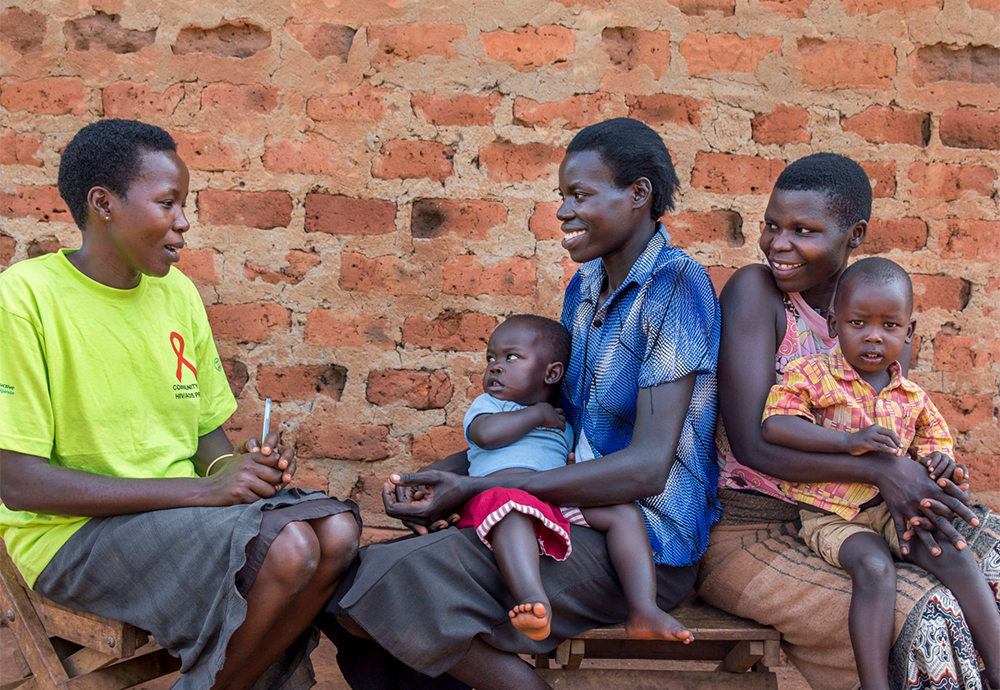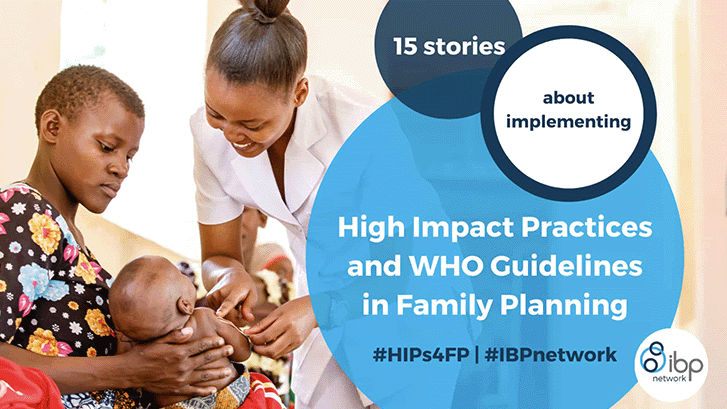Implementation Stories: How Programs Use High Impact Practices and WHO Guidelines
IBP Network Presents Real-Life Experiences from Family Planning Programs

In early 2020, the WHO/IBP Network and Knowledge SUCCESS Project launched an effort to support organizations to share their experiences using High Impact Practices (HIPs) and WHO Guidelines and Tools in Family Planning and Reproductive Health Programming. The initial call for concepts led to over 100 submissions from more than 30 countries. In June 2020, we selected the winners—15 organizations and authors received a stipend to document and tell their story in their own words and with their own images. Authors were encouraged to highlight the successes, challenges, and lessons learned implementing High Impact Practices in Family Planning and using WHO Guidelines and Tools in country-level programs.
We are proud to announce the publication of these 15 Implementation Stories on the WHO/IBP Network Website. The winning stories represent a diverse range of partners from 15 countries around the world. Twelve stories were originally published in English, two in Spanish, and one in French, but all 15 stories will soon be available in all three languages.
Stories cover a range of topics from clinical service delivery to community engagement and showcase interventions in urban areas, rural and hard to reach places, and humanitarian settings. In addition, stories reflect work with a diversity of communities including men and boys, people with disabilities, youth and adolescents, and indigenous populations.
Most of the stories focus on service delivery interventions such as Mobile Outreach, Community Health Workers, Immediate Postpartum Family Planning, Drug Shops and Pharmacies, and FP Immunization Integration. There are also several that discuss Community Group Engagement, Supportive Policies, Domestic Public Financing, and Adolescent Responsive Contraceptive Services.
The WHO Medical Eligibility Criteria (MEC) and MEC Wheel, Family Planning: A Global Handbook for Providers, and the Family Planning Training Resource Package were applied in many of projects described in the stories. Other guidance—such as Ensuring Human Rights in the Provision of Contraceptive Information and Services, Quality Assessment Handbook, Guidance for Contraception for Women at High Risk of HIV, and selected WHO Guidelines for Adolescent Health—was also mentioned in some stories.

While these stories are diverse in topics and geography, there were some common themes and lessons learned throughout:
1) High Impact Practices are not implemented in isolation
In many of the Implementation Stories, while the focus was on one specific practice, these practices were often combined with others. For example, the “One Stop Shop” program by EngenderHealth Tanzania highlighted mobile outreach for family planning that linked to existing outreach services for HIV & TB screening, immunizations, and ARV refill days.
2) There are other “best practices” that are critical to successful program implementation
In many stories there were other practices that were mentioned that were essential to ensuring successful outcomes of the program. For example, in Nigeria, as part of “An integrated approach to increasing postpartum long-acting reversible contraception” by Clinton Global Health Access Initiative Inc., a detailed and robust mentoring program was incorporated for providers to support continued training, capacity building, and sustainability.
3) Linking WHO Guidelines and programmatic High Impact Practices facilitates use
Authors recognized the value of WHO Guidelines and Tools and expressed the need to better connect them with programmatic interventions like the HIPs. This can strengthen the quality of implementation and facilitate better use of WHO Guidelines at a more localized level. For example, in Burkina Faso, as part of the Jhpiego “Strengthening preservice education of midwifery and obstetrics and gynecology,” pre-service training was provided using the WHO Medical Eligibility Criteria and new graduates were given print copies of Family Planning: A Global Handbook for Providers.
4) Family planning programming is intersectoral
In almost every story there were links between the family planning/health program and other aspects of community development such economic growth, education, community empowerment, climate, and government advocacy.
5) Supporting documentation efforts contributes to knowledge sharing
Providing partners with both funding and technical support to share their stories with their own voices not only enabled a fun and dynamic way to share experiences, but also provided an opportunity to strengthen capacity around documentation. It also allowed an exchange of information between authors and allowed partners to disseminate and share in their own country settings.
On April 20, the IBP Network hosted a webinar for the global launch of the series (see details and listen to a recording here). In the coming months, WHO/IBP Network and Knowledge SUCCESS will be hosting a series of webinars with Implementation Story authors to hear more about their experiences; we look forward to bringing you more information soon.





